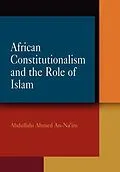Constitutionalism is steadily becoming the prevalent form of governance in Africa. But how does constitutionalism deal with the lingering effects of colonialism? And how does constitutional law deal with Islamic principles in the region? African Constitutionalism and the Role of Islam seeks to answer these questions. Constitutional governance has not been, nor will be, easily achieved, Abdullahi Ahmed An-Na'im argues. But setbacks and difficulties are to be expected in the process of adaptation and indigenization of an essentially alien concept-that of of nation-state-and its role in large-scale political and social organization. An-Na'im discusses the problems of implementing constitutionalized forms of government specific to Africa, from definitional to conceptual and practical issues. The role of Islam in these endeavors is open to challenge and reformulation, and should not be taken for granted or assumed to be necessarily negative or positive, An-Na'im asserts, and he emphasizes the role of the agency of Muslims in the process of adapting constitutionalism to the values and practices of their own societies. By examining the incremental successes that some African nations have already achieved and An-Na'im reveals the contingent role that Islam has to play in this process. Ultimately, these issues will determine the long-term sustainability of constitutionalism in Africa.
Autorentext
Abdullahi Ahmed An-Na'im is Charles Howard Candler Professor of Law at Emory University School of Law. He is the author of Toward an Islamic Reformation (1990). He is also editor of several books, including Human Rights Under African Constitutions and Human Rights in Cross-Cultural Perspectives, both available from the University of Pennsylvania Press.
Inhalt
Preface
Chapter 1: Toward an Inclusive Theory of Constitutionalism
Chapter 2: Elements of African Constitutionalism
Chapter 3: Evaluating Experiences in Incremental Success
Chapter 4: The Contingent Role of Islam
Chapter 5: Islam and Constitutionalism in Sudan, Nigeria, and Senegal
Chapter 6: Conclusions: Sustainable Constitutionalism Through Practice
Reference List
